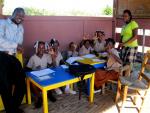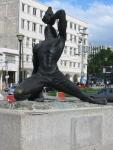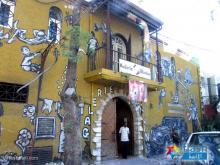Livelihoods
Galerie Monnin and Vassar Haiti Project Celebrate Haitian Art (Washington DC)
More than 230,000 Haitian Children to Benefit from Improved Schooling
 The World Bank finalized a $24 million grant to Haiti that will help 230,000 children attend schools and receive quality education through tuition waivers and other forms of support. While the Haitian Constitution states children have the right to an education, the vast majority of schools are private and charge fees. Even with public schools, the cost of uniforms can be prohibitive. More information on the "Education for All" program is available here. The full announcement follows.
The World Bank finalized a $24 million grant to Haiti that will help 230,000 children attend schools and receive quality education through tuition waivers and other forms of support. While the Haitian Constitution states children have the right to an education, the vast majority of schools are private and charge fees. Even with public schools, the cost of uniforms can be prohibitive. More information on the "Education for All" program is available here. The full announcement follows. IDB Approves Grants for Northern Industrial Park, Energy Modernization
 The Inter-American Development Bank (IDB) recently announced the approval of two grants for Haiti totaling US $90 million. One grant is devoted to the development of an industrial park between Ounaminthe and Cap Haitian while the other is devoted to modernizing Haiti's energy sector. This is worth noting as investment outside of Port au Prince is unfortunately still rare. The IDP's support for the energy sector will allow for upgrading the Peligre Hydroelectric Dam and promotion of solar energy projects.
The Inter-American Development Bank (IDB) recently announced the approval of two grants for Haiti totaling US $90 million. One grant is devoted to the development of an industrial park between Ounaminthe and Cap Haitian while the other is devoted to modernizing Haiti's energy sector. This is worth noting as investment outside of Port au Prince is unfortunately still rare. The IDP's support for the energy sector will allow for upgrading the Peligre Hydroelectric Dam and promotion of solar energy projects.
An Island Divided: Haiti and the Dominican Republic
 One World Education is a Washington DC based non profit organization that specializes in teaching high school students to write about cultural/global issues. Andre Sanabia, a tenth grader from Alexandria who participates in the program, wrote a piece questioning how Haitians (and Dominicans of Haitian descent) are treated in the Dominican Republic. I wish more politicians in the Dominican Republic possessed Andre's introspectiveness. As he notes, a little kindness goes a long way.
One World Education is a Washington DC based non profit organization that specializes in teaching high school students to write about cultural/global issues. Andre Sanabia, a tenth grader from Alexandria who participates in the program, wrote a piece questioning how Haitians (and Dominicans of Haitian descent) are treated in the Dominican Republic. I wish more politicians in the Dominican Republic possessed Andre's introspectiveness. As he notes, a little kindness goes a long way.
Invitation: Haitian Recycling Conference (July 23-24, 2011)
 Below is an invitation to a recycling conference that will be held at Wahoo Bay Beach Resort outside of Port au Prince July 23-24, 2011. If you have been to Port au Prince, then you have seen the plastic bottles clogging up drainage canals throughout the city. This is one of many vulnerabilities during the rainy season. Nationwide recycling would create jobs and clean up Haiti's ever growing cities. To learn more about Ramase Lajan (Gather the Money) visit Haiti Recycling website. Recycling plastic, rubble, and trash could become important components of Haiti’s reconstruction.
Below is an invitation to a recycling conference that will be held at Wahoo Bay Beach Resort outside of Port au Prince July 23-24, 2011. If you have been to Port au Prince, then you have seen the plastic bottles clogging up drainage canals throughout the city. This is one of many vulnerabilities during the rainy season. Nationwide recycling would create jobs and clean up Haiti's ever growing cities. To learn more about Ramase Lajan (Gather the Money) visit Haiti Recycling website. Recycling plastic, rubble, and trash could become important components of Haiti’s reconstruction.
PAZAPA: 2010 In Review
 Established in Jacmel in 1987, the mission of PAZAPA (Step by Step) is to support the treatment, education and development of children with disabilities and to integrate them into their communities. During the earthquake, the PAZAPA School was damaged beyond repair. PAZAPA has since acquired new land and established temporary structures within which to continue classes. Both the special education school and the school for the deaf are functioning. Fortunately, none of the PAZAPA staff were hurt and stipends were provided to help them rebuild their homes. Below are excerpts from PAZAPA’s recently completed 2010 Annual Report.
Established in Jacmel in 1987, the mission of PAZAPA (Step by Step) is to support the treatment, education and development of children with disabilities and to integrate them into their communities. During the earthquake, the PAZAPA School was damaged beyond repair. PAZAPA has since acquired new land and established temporary structures within which to continue classes. Both the special education school and the school for the deaf are functioning. Fortunately, none of the PAZAPA staff were hurt and stipends were provided to help them rebuild their homes. Below are excerpts from PAZAPA’s recently completed 2010 Annual Report.
The Long Road to Recovery (1/25/2010)
 Haiti is forever changed. At least 150,000 people, equivalent to the population of Tallahassee, have died. At least 600,000, more than the population of Seattle, are without homes. Over 130,000, approximately the population of Syracuse, have left Port au Prince for the countryside. After a disaster of this magnitude, life does not go back to normal. Still, even in the face of great uncertainty, life goes on. Telecommunications are mostly up and running, some banks are opening, more gas stations are functional, markets and factories are re-openening. Neighborhood committees are meeting and people are attending church services. All agree it will take many years to rebuild. The question is how Haiti can recover and be built back better than it was before?
Haiti is forever changed. At least 150,000 people, equivalent to the population of Tallahassee, have died. At least 600,000, more than the population of Seattle, are without homes. Over 130,000, approximately the population of Syracuse, have left Port au Prince for the countryside. After a disaster of this magnitude, life does not go back to normal. Still, even in the face of great uncertainty, life goes on. Telecommunications are mostly up and running, some banks are opening, more gas stations are functional, markets and factories are re-openening. Neighborhood committees are meeting and people are attending church services. All agree it will take many years to rebuild. The question is how Haiti can recover and be built back better than it was before?
Haiti Turning Garbage Into Energy
 Jacqueline Charles of the Miami Herald wrote a very interesting piece on the UNDP facilitated program in Carrefour Feuilles that turns trash into an alternative, affordable fuel source in the form of briquettes. This initiative, featured in the BBC 2009 World Challenge, cleans up Port au Prince while creating jobs, including for former charcoal vendors. Simply put, there is no solution for rural deforestation without addressing Port au Prince's energy needs. Until that time, cargo truck after cargo truck of wood charcoal will travel to Haiti's largest city every day. This program is ripe for expansion, and eventually, replication. Click here for the article and videos.
Jacqueline Charles of the Miami Herald wrote a very interesting piece on the UNDP facilitated program in Carrefour Feuilles that turns trash into an alternative, affordable fuel source in the form of briquettes. This initiative, featured in the BBC 2009 World Challenge, cleans up Port au Prince while creating jobs, including for former charcoal vendors. Simply put, there is no solution for rural deforestation without addressing Port au Prince's energy needs. Until that time, cargo truck after cargo truck of wood charcoal will travel to Haiti's largest city every day. This program is ripe for expansion, and eventually, replication. Click here for the article and videos.

